Super User
Mondi launches extra-long digital formats (ELDFs) for its Color Copy original flagship range
Mondi extends its Color Copy original range with launch of ELDFs to meet the growing demand for digitally printed applications and offer more choice in the print market.
Mondi, a global leader in packaging and paper, extends its Color Copy original flagship range with extra-long digital formats (with lengths up to 1200 mm) to meet the growing demand for digitally printed applications. The extended range allows for a host of new print applications. The papers offer the highest possible quality in digital colour printing and provide customers with the choice between different long-sheet applications (personalised for each customer), both in large scale or single items.
Color Copy original ELDFs are compatible with all major printing machine manufacturers e.g. Konica Minolta, Ricoh, Xerox, Canon, and others. The range is both FSC® and EU Ecolabel certified as well as part of the Green Range, Mondi’s umbrella trademark for sustainable paper solutions, and has a ColorLok® certification for excellent colour reproduction and faster drying in inkjet printing.
“It is always our goal to produce high quality products that meet evolving needs and are sustainable by design. Color Copy original ELDFs are the perfect addition to our longstanding product range as we keep pushing the barrier in innovation.” says Johannes Klumpp, Marketing & Sales Director at Mondi Uncoated Fine Paper.
“The new Color Copy original ELDFs bridge a longstanding gap in the market and work very well on our AccurioPress colour production printers. They offer perfect runnability for our machines that have many advanced capabilities, including auto-duplex banners up to 900 mm, as well as inline finishing options to create ready-to-ship full bleed banners. The double-sided printing with precise front and back registration also made for a compelling choice," says Anja Schappert, Marketing Manager Print Substrates, Konica Minolta Business Solutions Europe.
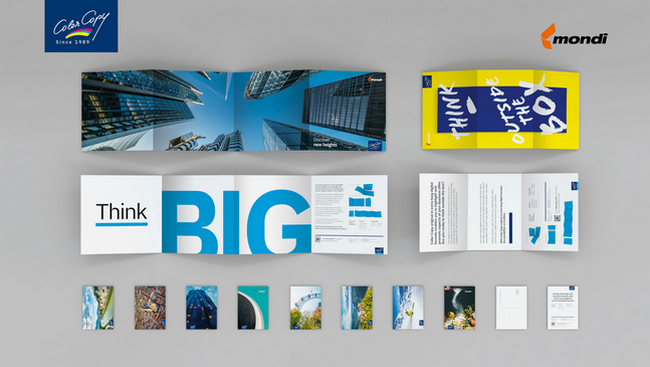
New technical developments increases demand for ELDFs
The new formats are designed for quality printing needs in the marketing sector, e. g. high quality brochures and posters in standout format which are particularly attractive for lifestyle and premium brands.
The Color Copy original ELDFs product range is a response to the latest technical developments in digital printing machines. While digital toner production presses were not able to work with long formats, new presses now have the ability to print on extended sheet sizes. By including ELDFs into their portfolio Mondi intends to support OEMs and printers to feature these new functionalities and offer a wider product range especially for high quality marketing collaterals. The supplies can be mill cut and packaged in individually wrapped reams to meet short deadlines.
The process is also more cost-effective for shorter runs as ELDFs maximize productivity through multi-up imposition of smaller jobs like business cards, invitations, direct mailers, and even smaller folding cartons. This can improve productivity by 25 percent.
Color Copy original ELDFs are available in 120, 160, 250 and 300 g/m² and 660x330/889x330/1200x330mm short grain across all Europe.
About Mondi Uncoated Fine Paper
Uncoated Fine Paper is a business unit of Mondi Group. In six operating sites in Austria, Slovakia, Russia, and South Africa, Mondi Uncoated Fine Paper produces pulp and environmentally sound office and professional printing papers tailored to the latest professional digital and offset print technologies. The company complies with the strictest international certification standards to support sustainable production processes through the responsible management of forest, water and air resources. All Mondi uncoated fine papers belong to the Green Range of papers that are FSC™ or PEFC™ certified, 100% recycled or bleached entirely without chlorine.
Its renowned brands such as Color Copy, PERGRAPHICA®, NAUTILUS®, NEUJET®, IQ, MAESTRO®, BIO TOP 3®, DNS®, Snegurochka or ROTATRIM are used in office environments on laser or inkjet printers and by professional printers on digital or offset presses to create brochures, transactional material, folders, invitations, business cards, letterheads or other high-impact communication. Converters appreciate the excellent printability and smooth handling of Mondi’s professional printing papers.
About Mondi
Mondi is a global leader in packaging and paper, contributing to a better world by making innovative packaging and paper solutions that are sustainable by design. Our business is integrated across the value chain – from managing forests and producing pulp, paper and plastic films, to developing and manufacturing effective industrial and consumer packaging solutions. Sustainability is at the centre of our strategy and intrinsic in the way we do business. We lead the industry with our customer-centric approach, EcoSolutions, where we ask the right questions to find the most sustainable solution. In 2020, Mondi had revenues of €6.66 billion and underlying EBITDA of €1.35 billion.
Mondi has a premium listing on the London Stock Exchange (MNDI), and a secondary listing on the JSE Limited (MNP). Mondi is a FTSE 100 constituent, and has been included in the FTSE4Good Index Series since 2008 and the FTSE/JSE Responsible Investment Index Series since 2007.
Successful start-up of paper production line 2 supplied by Voith to Kipaş Kağıt in Söke
On July 7th, Kipaş Kağıt successfully started up the first production line for board and packaging papers at its Söke site in western Turkey. As a full-line supplier, Voith supplied the entire plant with the latest production and automation technologies. The new PM 2 features a very wide production and basis weights range. As a result, the machine now produces up to 700,000 tons of high-quality board and packaging papers annually with basis weights from 90 to 400 g/m2 while maintaining consistent high quality. The new line has a maximum process design speed of 1,200 meters per minute and a wire width of 8,900 mm. “Since we were responsible for the entire implementation, we were able to optimally coordinate the individual components of the system with each other," says Kai Bestian, responsible Project Manager at Voith Paper.
- Voith supplied the entire production line for high-quality board and packaging papers.
- With the help of leading Voith technologies, the high-performance line will produce up to 700,000 tons of board and packaging papers annually.
- The efficient PM 2 is characterized by a high flexibility of basis weights between 90 and 400 g/m2 with consistent high quality.
Stock is transferred via three MasterJet headboxes. The EvoDry steel cylinders are the central element of the Combi DuoRun dryer section. As a result, the number of drying cylinders in the pre-dryer and after-dryer sections can be reduced, thus enabling lower operating costs while maintaining consistent quality. Another technological highlight is the flexibly designed wire section, which in future will enable the production of 26 different coated and uncoated paper grades. Uncoated grades are transported directly to the two VariFlex winders with two-drum technology via an intermediate Sirius winding system. Coated grades are coated online by bypassing the intermediate winding system. In addition, Voith supplied the entire water, sludge and reject handling systems as well as the water treatment plant for effluent treatment.
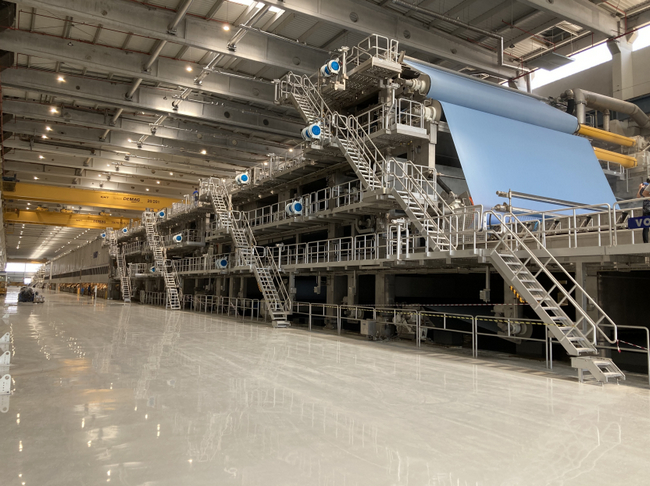 At the beginning of July, Kipaş Kağıt successfully started up the first production line for board and packaging papers at its Söke site in western Turkey.
At the beginning of July, Kipaş Kağıt successfully started up the first production line for board and packaging papers at its Söke site in western Turkey.
Kipaş Kağıt also benefits from a comprehensive clothing package and automation solutions consisting of the OnControl process control system, an OnQuality quality control system, an OnView information system, and an OnCare CM condition monitoring system. To ensure safe and efficient operations, Kipaş Kağıt and Voith also defined a substantial spare and wear parts package covering all parts to ensure maximum availability of the machine.
The start-up is an important milestone in the long-standing partnership between Kipaş Kağıt and Voith. In addition to Voith’s leading full-line capabilities, the positive experience gained in past projects also played an important role in the award of the contract.
About Kipaş Kağıt
Kipaş Kağıt A.Ş, started as a joint venture of Kipas Holding (kipas.com.tr) in 2011, is committed to producing high quality container board paper from waste paper by employing best-of-breed manufacturing technologies, human resources, and ethical values inherited from our founders. Today, with the acquisition of Teksan, which has a long history in the packaging industry, the company produces paper products such as testliner and fluting between 70 and 200 g/m2 as well as packaging products such as conical and cylindrical reels, honeycomb panel, honeycomb separator, cardboard pallet and cardboard bracket. Kipaş Kağıt saves 6,000 hectares of forest by producing 425,000 tons of paper annually from 100% recycled waste paper. The company's principle is to run a sustainable, ethical and socially responsible business that can be proudly passed on to future generations.
About the Voith Group
The Voith Group is a global technology company. With its broad portfolio of systems, products, services and digital applications, Voith sets standards in the markets of energy, oil & gas, paper, raw materials and transport & automotive. Founded in 1867, the company today has more than 20,000 employees, sales of € 4.2 billion and locations in over 60 countries worldwide and is thus one of the larger family-owned companies in Europe.
The Group Division Voith Paper is part of the Voith Group. As the full-line supplier to the paper industry, it provides the largest range of technologies, services and products on the market and offers paper manufacturers holistic solutions from a single source. The company’s continuous stream of innovations facilitates resource-conserving production and helps customers minimize their carbon footprint. With its leading automation products and digitalization solutions from the Papermaking 4.0 portfolio, Voith offers its customers state-of-the-art digital technologies to improve plant availability and efficiency for all sections of the production process.
European paper industry delivers on emission reduction and recycling commitments
With the slowing down of the European economy and the sanitary restrictions, European paper and board consumption decreased by 5.3% in 2020 compared to 2019, totalling 71 million tonnes.
Cepi members produced 85.2 million tonnes of paper and board, a decrease of 4.8% compared to 2019. This downward trend was observed in many other parts of the world, namely the US, Japan, Brazil and Canada.
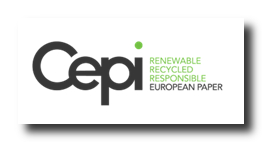 Covid crisis has accelerated both negative and positive existing trends
Covid crisis has accelerated both negative and positive existing trends
Despite the slowing down of the European economy and the sanitary restrictions, most of the mills ran without disruption in 2020; even if some operated at reduced speed because of lower levels of demand.
In 2020, the pandemic accelerated the structural decline of graphic grades but stimulated the production of packaging grades as well as sanitary and household paper. The overall output of graphic grades including newsprint fell by 19%. Demand from publishers, offices and commercial printing declined dramatically.
In contrast, the packaging paper and board as well as the sanitary and household paper production increased by 2.1% and 3.1% respectively in 2020 while speciality paper and board production remained stable.
Packaging paper and board are essential materials to transport and deliver supplies, such as medicines or food, they also benefitted from the acceleration of e-commerce related to the sanitary crisis. Demand for sanitary and household grades benefitted from higher hygiene requirements, despite the restrictions affecting the ‘away-from-home’ markets.
Also impacted by the economic slow-down and the decrease in paper and board production, pulp consumption decreased by 6.4%. Total pulp production decreased by 4.7% while market pulp output remained unchanged.
Net-exports remained strong despite minor decrease
Market pulp exports grew by 2.8% while paper and board exports decreased by 3.1%, a lower extent than production and imports (-4.5%). Looking at market pulp and paper and board combined, the share of our production going for export has reached a new height: 26% in 2020.
Sustainability performance on track
While providing essential products to European citizens in 2020, the European paper industry delivered on its competitiveness and sustainability agenda.
In spite of the pandemic impacting availability and quality of paper for recycling throughout 2020, the European recycling rate increased by 1.4 percentage points and reached 73.9% in 2020. Looking back at the progress made since 1998 - the base year for the first voluntary commitment set in the European Declaration on Paper Recycling [1]- recycling has increased by 40% or 16.0 million tonnes.
CO2 direct emissions from the European paper industry also declined by 7.1% in 2020, mainly due to the reduced activity but also the continuing efforts of the industry to decarbonise. As a result, the specific CO2 emissions (per tonne of product) further decreased in 2020 by 3.1%. In terms of energy use, 62.2% of the fuel consumption was based on renewable energy: woody biomass sourced from sustainably managed European forests.
“I am proud to announce today that our investments in reducing emissions and using more renewable energy are paying off, with a 7.1% reduction of our CO2 direct emissions last year. We continue to lead among industries switching to renewable energy, renewables represented 62.2% of our primary energy in 2020. Our climate commitment is even more important this year, just days ahead of the European Commission’s “Fit for 2030” package. It will radically revamp the regulatory framework to achieve higher emission reductions by 2030”, commented Jori Ringman, Cepi Director General.
Production will pick up with economic recovery in 2022
Looking ahead, the paper and board demand will undoubtedly benefit from the economic rebound forecasted for 2021. The EU economy is estimated to grow by 4.2% in 2021 and to strengthen to around 4.4% in 2022 according to the European Commission. As of end-April 2021, the production of paper and board in Cepi countries increased by1.0% over the same period of the previous year.
Access the full Cepi Key Statistics 2020 here.
[1] The European Paper Recycling Council (EPRC) was set up as an industry self-initiative in November 2000 to monitor progress towards meeting higher paper recycling targets.
About Cepi : Cepi is the European association representing the paper industry. We offer a wide range of renewable and recyclable wood-based fibre solutions to EU citizens: from packaging to textile, hygiene and tissue products, printing and graphic papers as well as speciality papers, but also bio-chemicals for food and pharmaceuticals, bio-composites and bioenergy.
We are a responsible industry: 92% of our raw materials are sourced in Europe and certified as sustainable, 91% of the water we use is returned to the environment, in good condition. We are the world champion in recycling at the rate of 72%. At the forefront of the decarbonisation and industrial transformation of our economy, we embrace digitalisation and bring 20 billion value addition to the European economy and €5.5 billion investments annually.
More information about our sustainability performance here.
Through its 18 national associations, Cepi gathers 500 companies operating 895 mills across Europe and directly employing more than 180,000 people.
A.Celli starts up the E-WIND® T100 rewinder supplied to Berli Jucker Cellox Co., Ltd
Thanks to the collaboration between the teams of the two companies, the start-up of the Tissue rewinder installed in the Prachinburi plant in Thailand was successfully completed.
A.Celli started up the rewinder supplied to Berli Jucker Cellox Co. Ltd, a subsidiary of the Berli Jucker Public Company Limited (BJC), in full compliance with the agreed time despite the difficult situation caused by COVID19 pandemic.
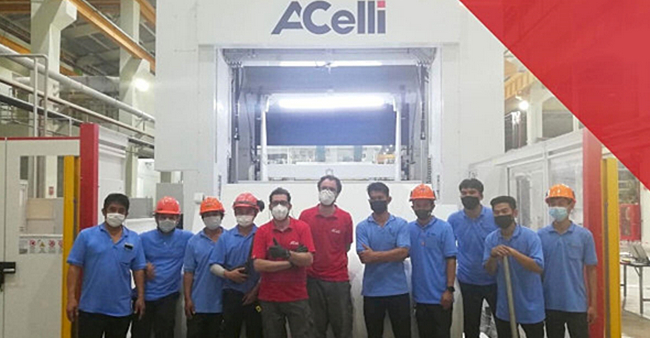
The A.Celli E-WIND® T100 Tissue rewinder was designed to process 3,000 mm diameter paper rolls with a width of 2750 mm and a basis weight ranging from 13 to 45 gsm, all at an operating speed of 1700 m/min. This will enable Berli Jucker Cellox Co., Ltd to produce up to 90 tons of tissue paper per day. Last but not least, the rewinder was equipped with the trimming removal system.
Mr. Chusak Soysungvarn, Berli Jucker Cellox Co. Ltd’s Prachinburi Plant Director, says: “It was difficult to put into words the happiness you get from seeing the first tissue reel came out from the A.Celli rewinder. We have focused heavily on this expansion project to enhance manufacturing efficiency, energy consumption and quality level to serve our customers in the best possible way. The machine definitely fulfilled our wishes and we were really satisfied by the excellent collaboration and services provided by the A.Celli team”.
BERLI JUCKER PUBLIC COMPANY LTD - Company Profile
Berli Jucker Public Company Limited (BJC) is a company with more than 135 years of history at the forefront of the trade, manufacturing and service fields in Thailand. Originally, BJC engaged in rice milling, mining, timber, shipping, importing, and other activities that laid a foundation instrumental for Thailand’s progress towards an “industrial” stage. After World War II, BJC diversified its operations into manufacturing, packaging and distribution.
Valmet receives the ninth tissue line order from Hayat Kimya in Russia
Valmet will supply the ninth tissue line delivery, including an extensive automation package, to Turkish tissue producer Hayat Kimya. The company has decided to invest in a new tissue machine at their new mill in Russia, with a target to meet the increasing demand for their high-quality tissue products. The new line will add 70,000 tons of tissue to their current production of facial, toilet and towel tissues. The start-up is planned for the end of 2022.
The order is included in Valmet’s orders received of the second quarter 2021. The value of the order will not be disclosed.
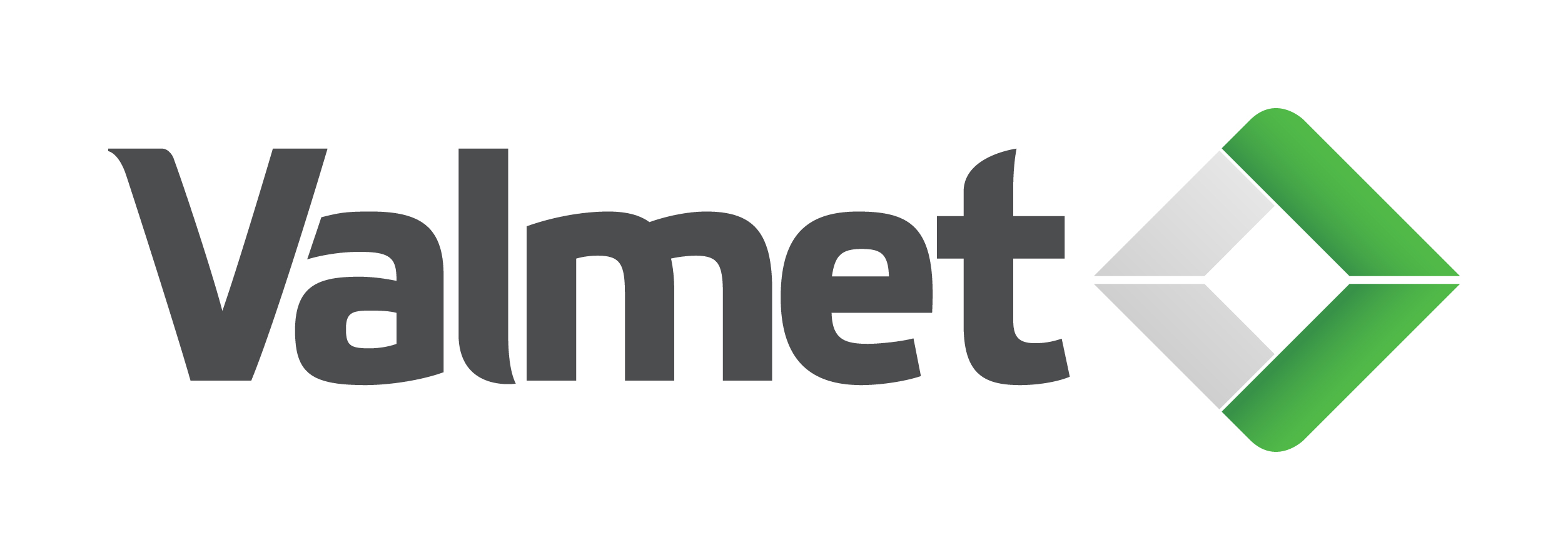 Hayat Kimya has previously installed seven Valmet Advantage DCT 200TS tissue production lines to its mills in Turkey, Russia and Egypt, and is currently installing the tissue machine TM9 at its new site in Russia. Hayat Kimya is constantly utilizing the latest technology to reach the highest efficiency and lowest possible energy consumption.
Hayat Kimya has previously installed seven Valmet Advantage DCT 200TS tissue production lines to its mills in Turkey, Russia and Egypt, and is currently installing the tissue machine TM9 at its new site in Russia. Hayat Kimya is constantly utilizing the latest technology to reach the highest efficiency and lowest possible energy consumption.
“Our ambition is to continuously improve our performance with each installation, and the Advantage DCT technology is certainly supporting that target. Together with Valmet, we have established an efficient way of working and have been able to reach very smooth and fast start-ups. Ever since the start-ups, we have been running the machines at constant high speed and efficiency,” says Lütfi Aydin, Director, Paper Group, Hayat Kimya.
“We are proud to have had the opportunity to deliver nine Advantage DCT machines in a row to Hayat Kimya. That is definitely a proof that the technology is reliable, efficient, easy to use and meets expected production and product quality targets. During the years, we have developed both good technical performance and team collaboration, so we are excited to continue the journey to also make this new project a success,” says Björn Magnus, Sales Director, Tissue Mills business unit, Paper business line, Valmet.
Technical information
The new tissue machine TM10 will have a width of 5.6 m and a design speed of 2,100 m/min.
The raw material to be used in the tissue production will be virgin fiber. The new production line is optimized to save energy and to enhance the quality of the final product.
Valmet’s scope of delivery will comprise a complete tissue production line featuring stock preparation systems and a Valmet Advantage DCT 200 TS tissue machine. The machine will be equipped with an OptiFlo headbox and a cast alloy Yankee cylinder. It will also be featured with the Advantage tissue technology including ViscoNip press with Valmet Black Belt R, an AirCap Heli hood and air system prepared for co-generation, WetDust dust system, sheet transfer system and a SoftReel L reel. The stock preparation line will consist of OptiSlush pulpers, OptiFiner conical refiners and OptiScreen machine screens.
Furthermore, the delivery will include an extensive Valmet automation package with Valmet DNA machine controls, drive controls, process controls and machine monitoring, as well as Valmet IQ quality controls with IQ Fiber and IQ Softness sensors, MD Controls and IQ Dilution CD Controls. Complete engineering, installation supervision, training, start-up and commissioning as well as a spare parts package are also included in the delivery.
Information about Hayat Kimya
Hayat Kimya A.S. is part of the Hayat Group. The Hayat Group primarily operates in the home care, hygiene and tissue categories for the consumer goods industry. Hayat has continued to invest significantly since their entrance into the tissue category 14 years ago and today the Group carries "The Largest Tissue Manufacturer of Africa, Middle East and Eastern Europe" title with 490,000 tonnes production capacity/year.
Valmet is the leading global developer and supplier of process technologies, automation and services for the pulp, paper and energy industries. We aim to become the global champion in serving our customers.
Valmet's strong technology offering includes pulp mills, tissue, board and paper production lines, as well as power plants for bioenergy production. Our advanced services and automation solutions improve the reliability and performance of our customers' processes and enhance the effective utilization of raw materials and energy.
Valmet's net sales in 2020 were approximately EUR 3.7 billion. Our 14,000 professionals around the world work close to our customers and are committed to moving our customers' performance forward - every day. Valmet's head office is in Espoo, Finland and its shares are listed on the Nasdaq Helsinki.
Read more www.valmet.com
Toscotec to supply a TT SYD Steel Yankee Dryer to Mirae Paper
Toscotec will supply a third-generation design TT SYD Steel Yankee Dryer to the South Korean tissue manufacturer Mirae Paper at their Jeonju paper mill. This is a repeat order from Mirae Paper who installed their first TT SYD on PM3 in 2013. The new steel Yankee will replace PM2’s existing cast-iron cylinder and it is scheduled for start-up in the second half of 2022.
The third-generation design of TT SYD Steel Yankee Dryer benefits from an ideal ratio of the weight, width and pitch of the internal ribs and the optimization of the shell thickness. The scope of supply includes the condensate removal system and Toscotec’s patented heads insulation for maximum thermal energy efficiency. The associated services include the complete project management, erection supervision, operation and maintenance training, commissioning and start-up assistance.
The TT SYD will be manufactured at Toscotec’s fully integrated TT SYD Technology Center in Massa (Italy), situated just 3 kilometers away from seaport to ensure fast and safe shipping operations.
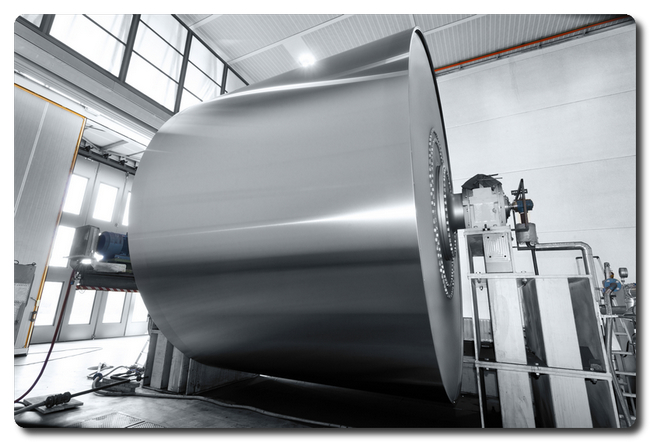
Toscotec is continuously upgrading the design of TT SYD, benefiting from the vast experience of over 200 TT SYD running across 5 continents worldwide under the most diverse operational and environmental conditions. This year, Toscotec has launched TT Defender®, a breakthrough patented innovation that equips TT SYD with an internal protection coating against corrosive steam.
Yeong Rok Lee, Mirae Paper’s Production Manager, says, “The steel Yankee on PM3 has been operating efficiently for over 8 years, allowing us to reduce our thermal energy consumption by a significant amount. We expect the new Yankee on PM2 to be as reliable and to deliver even higher performances, considered the design upgrades that Toscotec has implemented on their TT SYD since our first installation. We consider the Yankee dryer to be the core component of our tissue machine’s drying capacity. We chose the best technology available in the market, with all the technical support we need from an expert supplier.”
Gabriele Martinelli, Toscotec’s Sales Manager, says, “It is very rewarding that Mirae Paper has chosen Toscotec for the second time on their Yankee replacement. Toscotec strengthens its position in South Korea, where it is the only supplier of steel Yankee dryers, with 12 TT SYD sold in 9 years, including two installed on Toscotec’s AHEAD tissue lines.”
This order was obtained with the support of CleanTech Corporation, Yongin, South Korea.
About Mirae Paper Co., Ltd.
Established in 2000, Mirae Paper operates one paper mill in Jeonju, South Korea. The company manufactures approximately 65,000 tpy of high quality tissue, including toilet tissue, handkerchiefs, and towels, using recycled fibers. It distributes its products mainly to the Korean market.
Syassky PPM expands its business in the Fold sector thanks to the production lines for interfolded products and Kӧrber’s Customer Service
In Russia, the demand for innovative, high-quality tissue products, including disposable items following the pandemic, has increased significantly in recent years. For this reason, Syassky PPM, one of the most important paper mills in Russia, already active in the Roll sector, has decided to expand its product portfolio by relying on Körber Business Area Tissue’s Fold division.
Dmitry Epifanov, Syassky PPM’ Development Director, comments: "Syassky PPM has been a company with strong pioneering DNA since its foundation in 1928. Despite the strong instability of the markets, we have decided to expand our business in a new sector for us, such as that of interfolded products. This is why we have decided to rely on Körber, a unique, strong and reliable partner, with a complete range of advanced solutions and a global presence”.
Syassky PPM has identified the MTC ITF Towel, Automatic interfolding line for the production of V-folded Hand Towels, as the best solution for its market needs.
Irina Mozhaeva, Syassky PPM’s Chairman of the Board of Directors, comments: "It is not just a purchase of new equipment for us. This is a strategic investment in the development of our production. We plan to expand our presence in the Away from home market, an important part of which are folded products. Our main task is to offer the market the best quality products. I am confident that MTC line will provide us with such an opportunity".
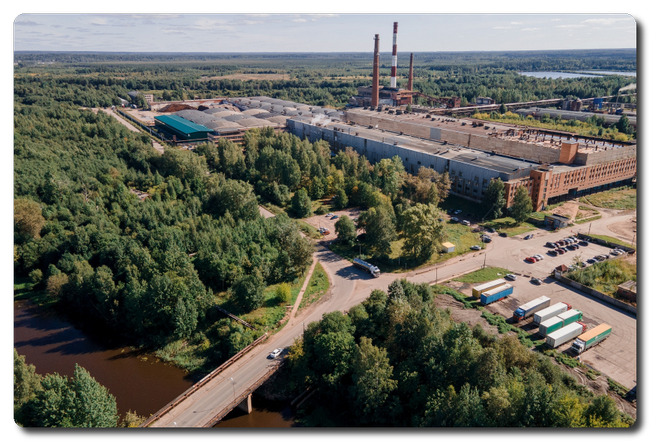
The ITF series interfolders make use of the most advanced electronic and mechanical technologies to always guarantee the quality of the finished product in every converting context, combined with high production capacity, reliability, and high efficiency.
These folding machines were conceived to be tailor-made for the customer, with high levels of customization. In fact, customers can choose the size of the final product as well as various other options.
Syassky PPM represented a further challenge for Körber. The current epidemiological situation linked to the COVID-19 pandemic risked slowing down the installation of the line, and the delay could have cost Syassky PPM precious business opportunities.
Maurizio Rossi, CS Sales Account &Senior Customer Service Engineer at Körber Business Area Tissue, comments: “The resources deployed by Kӧrber and the synergies that were created with Syassky PPM proved to be the key to overcoming the problems derived from COVID-19 restrictions. We accepted the challenge of lockdown, and it encouraged us to develop tools and devices to be able to provide technical assistance and completely support our customers even remotely, thus confirming our position as an innovative player.”
This year Körber introduced the Remote StartUP Teleassistance Team which, thanks to customized video applications, remote diagnostics, and detailed assembly and start-up instructions, was able to perform not only the Final Acceptance Tests (FAT) remotely with live streaming, but also more complex interventions and processes such as machinery installation, commissioning, and production start-up.
The close collaboration between Syassky PPM's mechanical and electrical engineering team and that of the Körber XpertTechnicians made it possible to install the line on schedule, just like usual installations with Körber technicians in attendance.
The MTC lines Körber Tissue Lines are reliable, easy to use, the technical assistance is highly qualified and the new assisted installation systems with which Körber machines are equipped, combined with the ability of the XpertTechnicians, make Körber the ideal supplier for companies that intend to expand their activity in the interfold sector.
JSC Syassky Pulp & Paper Mill
Founded in 1928 with the unique aim to cover the needs of the domestic market, in the last years Syassky PPM put in progress a huge investment process with the result to be able to satisfy the growing demand for domestic but also for export markets.
Körber Business Area Tissue
At Körber, our ultimate goal is to empower our customers’ ongoing success. We are the only truly integrated and global provider of advanced solutions for the tissue business. We offer the industry’s most comprehensive portfolio of tissue technology to support customers across the entire value chain — from roll to fold, from converting to packaging. Our advanced, automated, and easy-to-use integrated solutions are a fundamental asset to shape the success in tissue, take our customers operations to the next level, and strengthen their overall financial performance while optimizing their total cost of ownership.
About Körber
We are Körber – an international technology group with about 10,000 employees, more than 100 locations worldwide and a common goal: We turn entrepreneurial thinking into customer success and shape the technological change. In the Business Areas Digital, Pharma, Supply Chain, Tissue and Tobacco, we offer products, solutions and services that inspire. We act fast to customer needs, we execute ideas seamlessly, and with our innovations we create added value for our customers. In doing so, we are increasingly building on ecosystems that solve the challenges of today and tomorrow. Körber AG is the holding company of the Körber Group.
Clayton, Dubilier & Rice Exits Investment in Water Treatment Leader Solenis
Sale Follows Company’s Continued Growth and Success Driving Sustainability and Operational Efficiency in Water-Intensive Industries
Clayton, Dubilier & Rice (“CD&R”) today announced an agreement under which its portfolio company, Solenis, will be acquired by Platinum Equity. The transaction, expected to close before the end of 2021, implies an enterprise value for Solenis of $5.25 billion. CD&R and Solenis management currently collectively own 51% of Solenis, and chemical company BASF holds the remaining 49%. Both CD&R and BASF will fully exit Solenis as part of the transaction announced today.
Founded in 1907 and headquartered in Wilmington, Delaware, Solenis is a global leader in supplying innovative specialty chemicals and services for process, functional and water treatment applications to consumer and industrial markets. The company’s global footprint spans across 120 countries and five continents, and comprises over 5,200 employees and 41 manufacturing facilities. The company’s two primary business segments, Consumer and Industrial, deliver solutions that help customers drive sustainability and operational efficiency while reducing costs, and together represent significant growth potential for the business.
 CD&R funds acquired a majority stake in Solenis from Ashland, Inc. in a July 2014 transaction that ascribed an enterprise valuation of $1.8 billion to Solenis. In 2019, Solenis merged with BASF’s Paper & Water Chemicals business, creating a leading solutions provider for the pulp & paper and water treatment industries.
CD&R funds acquired a majority stake in Solenis from Ashland, Inc. in a July 2014 transaction that ascribed an enterprise valuation of $1.8 billion to Solenis. In 2019, Solenis merged with BASF’s Paper & Water Chemicals business, creating a leading solutions provider for the pulp & paper and water treatment industries.
Under CD&R’s ownership, Solenis enhanced its service-intensive business model, which relies on its more than 1,400 highly trained sales technicians operating on site at customers’ facilities. This operational focus allowed Solenis to expand its presence in the market, increase its customer base and enhance its approach to delivering sustainable value. It also enabled Solenis to navigate the challenges of the COVID-19 pandemic whilst retaining a strong financial profile and creating opportunities for continued growth in the future.
“We’re proud to have supported Solenis’ growth strategy and have enjoyed working alongside the company’s talented team since our initial investment in 2014,” said CD&R Partner Stephen Shapiro. “In that time, Solenis has significantly expanded its global presence, strengthened its customer offerings, and emerged as a sustainability leader. We’re pleased to have found a strong new investment partner for Solenis and look forward to following the company’s continued success.”
This transaction is a strong validation of the growth and success we have achieved over the last seven years under CD&R ownership,” said Solenis Chief Executive Officer John Panichella. “We thank the CD&R team for its support, which has positioned us well for this exciting next phase of growth with our new investment partners at Platinum.”
BofA Securities and Citigroup Global Markets served as co-financial advisors for Solenis, and Debevoise & Plimpton LLP provided legal counsel to Solenis. BofA Securities and Citi acted as financial advisors, and Debevoise & Plimpton LLP provided legal counsel to CD&R. Piper Sandler Valence acted as financial advisor and Gibson, Dunn & Crutcher LLP provided legal counsel to Platinum.
About Clayton, Dubilier & Rice
Clayton, Dubilier & Rice (“CD&R”) is a private investment firm with a strategy predicated on building stronger, more profitable businesses. Since inception, CD&R has managed the investment of more than $35 billion in 100 companies with an aggregate transaction value of more than $150 billion. The Firm has offices in New York and London. For more information, please visit www.cdr-inc.com.
About Solenis
Solenis is a leading global producer of specialty chemicals focused on delivering sustainable solutions for water-intensive industries, including the pulp, packaging paper and board, tissue and towel, oil and gas, petroleum refining, chemical processing, mining, biorefining, power and municipal markets. The company’s product portfolio includes a broad array of water treatment chemistries, process aids, functional additives as well as state-of-the-art monitoring and control systems. These technologies are used by customers to improve operational efficiencies, enhance product quality, protect plant assets and minimize environmental impact. Headquartered in Wilmington, Delaware, the company has 41 manufacturing facilities strategically located around the globe and employs a team of more than 5,200 professionals in 120 countries across five continents. Solenis is a 2021 US Best Managed Company. Learn more here and at www.solenis.com.
Essity invests in improved recycling of food and beverage cartons in France
Global hygiene and health company Essity invests approximately EUR 11m (approximately SEK 110m) in its Hondouville mill in France, allowing to extract 98% of paper fibers contained in food and beverage cartons.
Since 2008, Essity’s Hondouville mill has been the leading recycler in France of food and beverage cartons, currently recycling more than 63% of all cartons that are sorted, collected, and recycled in the country*. This new investment will allow Essity to increase the recycling capacity of cartons to 24,000 tons a year. The fibers from these cartons are used in the fiber mix to manufacture Tork branded products within Professional Hygiene.
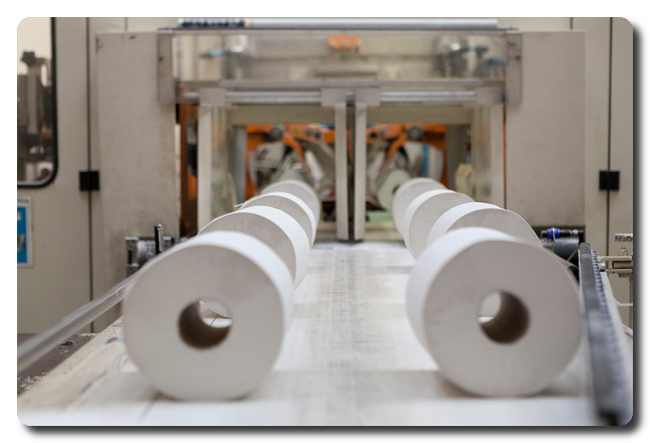
“This investment improves our contribution to a circular society with cost-effective and sustainable production. We also take important steps towards reaching Essity’s goal that all production waste will be subject to material or energy recovery by 2030”, says Magnus Groth, President and CEO at Essity.
The improved recycling system will be operational during the first half of 2022.
- Source: CITEO and Alliance Carton Nature
Essity is a leading global hygiene and health company. We are dedicated to improving well-being through our products and services. Sales are conducted in approximately 150 countries under the leading global brands TENA and Tork, and other strong brands, such as JOBST, Leukoplast, Libero, Libresse, Lotus, Nosotras, Saba, Tempo, Vinda and Zewa. Essity has about 46,000 employees. Net sales in 2020 amounted to approximately SEK 122bn (EUR 11.6bn). The company’s headquarters is located in Stockholm, Sweden, and Essity is listed on Nasdaq Stockholm. Essity breaks barriers to well-being and contributes to a healthy, sustainable and circular society. More information at www.essity.com
BillerudKorsnäs launches strong, super-light cartonboard
BillerudKorsnäs is introducing two new low grammages of their flagship cartonboard product, CrownBoard Prestige®. Made at KM7, the world’s most modern board machine, the two new low grammages are particularly interesting for the graphical industry.
CrownBoard Prestige® 170 and 200 gsm combine an excellent printing surface with strength and shapeability. The technical properties of the board are due to the capabilities of KM7, including advanced coating technology and state-of-the-art online quality monitoring. Despite the low basis weights, it is a strong board, made of 100% primary wood fibres built up in a 3-ply structure.
Thanks to the strength, it is possible to choose a light grammage to reduce packaging weight. With CrownBoard Prestige®, this can be done without compromising packaging performance. Lightweighting saves cost and reduces environmental impact, because less raw material is used, less energy is needed, less waste is generated, and transport and warehousing requirements are reduced. CrownBoard Prestige® helps customers make a sustainable choice.
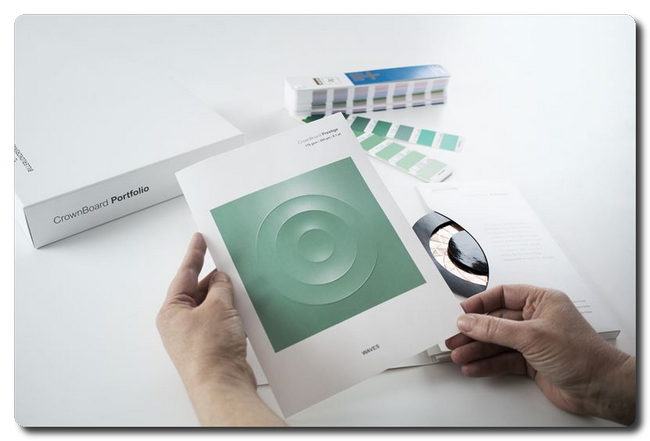 Print effect sample of CrownBoard prestige 170 gsm. Despite the low grammage, the board is strong enough to allow for post-print techniques. CMYK offset print, light embossing, and water-based print varnish.
Print effect sample of CrownBoard prestige 170 gsm. Despite the low grammage, the board is strong enough to allow for post-print techniques. CMYK offset print, light embossing, and water-based print varnish.
Visual impact
“The low basis weights are a range extension that opens up new possibilities for the graphical industry,” says Anders Gathu, Marketing Manager Cartonboard BillerudKorsnäs. “Eye-catching and strong book covers that also endure more and last longer. Post cards and greeting cards with a surface that gives you vibrant colours and lifelike image reproduction. This is thanks to a smooth, fully coated and high-white surface. It is also well suited for digital printing, an economic option for shorter print runs. Furthermore, the board is engineered to yield great results with printing techniques such as embossing, foil stamping, lamination and effect varnish. This is cartonboard that invites designers to push limits.”
Packaging for premium brands
With the addition of 170 and 200 gsm, the CrownBoard Prestige range comprises ten grammages – from 170 to 400 gsm. CrownBoard Prestige is developed to meet the needs of discerning brands for packaging premium consumer goods such as luxury drinks, confectionery, cosmetics, pharmaceuticals, and the graphical industry. It is chosen for its packaging performance, visual appeal and sustainability credentials.
/box
|
170 gsm |
200 gsm |
|
Caliper 205 µm |
Caliper 255 µm |
|
Caliper 8.1 pt |
Caliper 10.0 pt |
BillerudKorsnäs provides packaging materials and solutions that challenge conventional packaging for a sustainable future. We are a world-leading provider of primary fibre based packaging materials and have customers in over 100 countries. The company has 8 production units in Sweden, Finland and the UK and about 4500 employees in over 13 countries. BillerudKorsnäs has an annual turnover of about SEK 24 billion and is listed on Nasdaq Stockholm. www.billerudkorsnas.com
